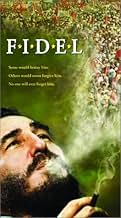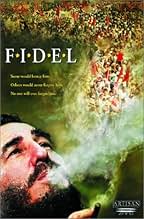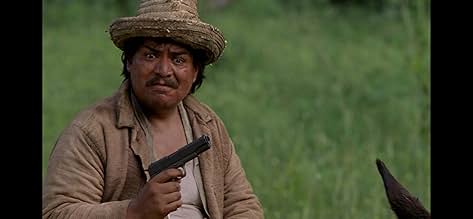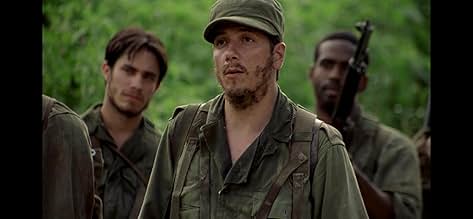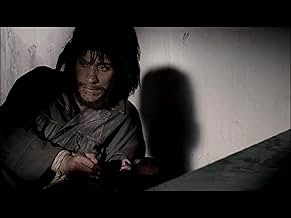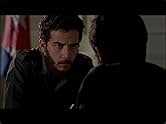ÉVALUATION IMDb
6,6/10
1,3 k
MA NOTE
Ajouter une intrigue dans votre langueFidel Castro rises to power in Cuba.Fidel Castro rises to power in Cuba.Fidel Castro rises to power in Cuba.
- Director
- Writers
- Stars
- Prix
- 3 nominations au total
Margarita Rosa de Francisco
- Naty Revuelta
- (as Margarita d'Francisco)
Alejandra Gollas
- Haydeé Santamaría
- (as Alejandra Gollás)
Guillermo Diaz
- Universo Sanchez
- (as Guillermo Díaz)
Avis en vedette
Some TV productions of late have been fantastic, and many are duds. `¡Fidel!' is interesting for content but disappointing in production. Huggo Martin has good moments in the title role, but mostly he walks through the lines without imparting believability to them. Other cast members do the same. Of course, Fidel Castro is a fascinating character. Viewing this film does flesh out a Yankee's knowledge of his life. Yet, so much remains unanswered. The first segment portrays him as an idealistic leader of the justified overthrow of General Batista. His failures seem somehow related to lack of realistic planning, but he triumphs in the end at least in part by his reliance on subordinates. Then, the second segment takes us to the Castro government in power. Here, we see a megalomaniac who makes his own decisions regardless of reality or the opinions of others. He sells out his revolution out to the Soviets for no apparent reason other than his hate for the U. S. The regime becomes a disaster for the Cuban people. The film makes no effort to explain the abrupt change. Is it just the taste of power, or is there an illness within Castro's mind? Were we deceived at first? Castro and the Che Guevara character often throw allegations toward the CIA, but all of that is also left vague. A viewer interested in the subject here can only come away terribly unsatisfied.
As Hemingway wrote, "A murderous tyranny pervades every village in the island". For the fool who wrote that Castro robbed Cuba of its true freedom, this was written before the popular revolution from within, not imposed from outside, which overthrew a regime so corrupt even the Mafia didn't have to break the law. Some Mafia moved to Miami, none of whom were African or mulatto. As portrayed, Batista's troops were fairly treated, as soldiers who joined because no other work was available and under corrupt officers who would rather be in the cities collecting their kickbacks. No wonder so many troops went over to the rebels! Too bad it lacked the antecedent showing Castro as the most popular politician in Cuba before the revolution -running for their Congress and hailed as a future President. Batista's 1952 coup wherein he seized power, dissolved Congress, and canceled elections rated less than a minute. Castro sued Batista for Illegal Succession! Flee Cuba? Much greater numbers flee Latin America, Mexico, Guatemala (where they have death squads) and even our Most Favored Trade partner China. They do it for economic opportunity. ONLY Cubans are allowed to remain if they make it ashore; sometimes employing people smugglers with no regard for life. U.S. Immigration grants a few hundred visas to Cubans annually, not the 20,000 and more we agreed to; Nonetheless arriving here illegally is OK. Anyone who has flown to Cuba has met Cubans aboard returning home, then seen no military presence there, and maybe noted that some Cuban cops don't even carry guns. Yes, I've been there a number of times. Don't like that? Stuff it, fool! What are fools and liars like Enrique afraid we'll see down there? Hmmm, maybe one is that they have multiple candidates for each office, need not be party members or millionaires to win, that 1/3 of the National Assembly are not party members. Ride in a cab in Cuba; you may well hear a Florida station selected on its radio. Bring T-shirts bearing logos of U.S. products, teams, and stars & stripes, even "U S Army". They make great gifts, are commonly worn, and no, fool, they don't disappear from the streets as they did in Chile.
This film is as if aliens who know or care nothing about either leftist or rightist politics came from another planet and catalogued Fidel's rise to power in Cuba. It very objectively chronicles the good and bad about the regime and pulls no punches.
Undoubtedly, there is a considerable amount more bad than good about Castro (note: to those of you whose demonize Pinochet, Castro was worse) but we get the point just the same without having to catharticly dwell on the killed, tortured, exiled, and imprisoned souls of Cuba. Just gives us the facts... nice one.
Undoubtedly, there is a considerable amount more bad than good about Castro (note: to those of you whose demonize Pinochet, Castro was worse) but we get the point just the same without having to catharticly dwell on the killed, tortured, exiled, and imprisoned souls of Cuba. Just gives us the facts... nice one.
It is certainly very difficult for someone to prepare well a film about Fidel Castro and Cuban Revolution. One lengthy film is not enough, may be some sequels are the best way to show something consistent. The director and producers should be obviously people neutral trying to show good and bad of this process. The film from historical point of view has a lot of incoherences, persons like Fidel and Raúl Castro as well as Che Guevara are badly played. Fidel Castro is not so sweet talking as you can see him in this film, while Guevara was a man with culture and deep in his arguments, Gael García Bernal played a role far to be Che Guevara. There are also some doubtful scenes and assertions, e.g. young Fidel Castro arguing with the American Ambassador after the American marines raped the monument of José Martí. Historically there is no evidence that Castro had such a discussion with the ambassador. Raúl Castro was never sympathetic to the leader of Orthodox party, Eduardo Chivas. Raúl was a member of the youth of the so-called Partido Socialista Popular (Communist), and this party had no good relationship with Orthodox party, so the scene of Raúl running together with Fidel at the time Chivas shot himself is not real. Celia Sánchez died several years after the revolutionary offensive, which happened in 1967. Che Guevara resigned as Minister and went first to Congo, then came back to Cuba in order to prepare the guerrilla for Bolivia. Thus the film was wrong showing that Guevara resigned and went directly to Bolivia. Any film about Cuban Revolution should give some space to Camilo Cienfuegos' life, a real hero of the Cuban Revolution, who was badly shown in the film. The figure of Dr. Osvaldo Dorticos, the second president during the Revolution, who killed himself, is absent in the film. Hubert Matos' problem was touched superficially, the same is applicable to the case of General Ochoa, just mentioned slightly at the end of the film and mixed with Mariel exodus, the latter happened in 1980 while Ochoa was arrested and processed in 1989. The relationship between Cuba and USSR was historically very complicated, and shifting from time to time. I can make a longer list of historical shortcomings of this film, but it also has the Mexican accent of the actors talking in Spanish plus some extras that do not look at all as Cubans. To prepare a good material about Cuba you must have more mulatos and black people (no less than 40% of Cuban population) participating in the film.
I must say this movie was quite well presented. It surprised me to see a self centered movie about Fidel Castro even it was produced by an american company.
I don't want to talk about what Fidel has done or what he hasn't done as Cuba's president.
I liked the movie because it presents a certain episode in Cuba's history. I disagree on the comments presented before about Fidel's actions against his political opponents because it's the director's and the producer's decision what episodes to present in a movie. As far as I know, they're free to talk only about certain moment in Cuba's history. It's ok to disagree on that, but there's no way to criticize it because it will be doing the same people criticizes on Fidel: his lack of acceptance to different points of view and his tolerance to people who don't agree with him.
I don't want to talk about what Fidel has done or what he hasn't done as Cuba's president.
I liked the movie because it presents a certain episode in Cuba's history. I disagree on the comments presented before about Fidel's actions against his political opponents because it's the director's and the producer's decision what episodes to present in a movie. As far as I know, they're free to talk only about certain moment in Cuba's history. It's ok to disagree on that, but there's no way to criticize it because it will be doing the same people criticizes on Fidel: his lack of acceptance to different points of view and his tolerance to people who don't agree with him.
Le saviez-vous
- AnecdotesGael García Bernal's close friend, actor Diego Luna, has a cameo in the film. He's seen for just a few seconds in the assault on the Moncada Barracks, where he's shot.
Meilleurs choix
Connectez-vous pour évaluer et surveiller les recommandations personnalisées
Détails
- Durée3 heures 33 minutes
- Couleur
Contribuer à cette page
Suggérer une modification ou ajouter du contenu manquant

